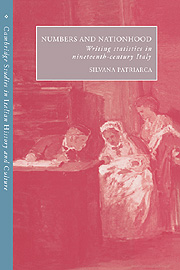Book contents
- Frontmatter
- Contents
- List of illustrations
- Acknowledgments
- Map 1 Italy during the process of unification
- 1 Introduction
- 2 A science for the “civilizing” of nations
- 3 The logics of statistical description
- 4 Official numbers
- 5 “Patriotic” statistics
- 6 The identity of the Italians
- 7 A map of the new nation
- 8 Center and periphery
- 9 Epilogue
- Appendix: Numbers of statistical publications
- Select bibliography
- Index
1 - Introduction
Published online by Cambridge University Press: 14 October 2009
- Frontmatter
- Contents
- List of illustrations
- Acknowledgments
- Map 1 Italy during the process of unification
- 1 Introduction
- 2 A science for the “civilizing” of nations
- 3 The logics of statistical description
- 4 Official numbers
- 5 “Patriotic” statistics
- 6 The identity of the Italians
- 7 A map of the new nation
- 8 Center and periphery
- 9 Epilogue
- Appendix: Numbers of statistical publications
- Select bibliography
- Index
Summary
When we think about modern states we often envision statistical aggregates. Area, population, size of the gross national product, the level of the national debt, these are identifying features that we take for granted, as an obvious way of representing territorial entities. Yet numbers have not always enjoyed this position, and in fact their rise as a fundamental mode of representation is a relatively recent process. Although the first systematic attempts to provide numerical evaluation of the population and wealth of states can be traced back to the consolidation of modern states in the seventeenth and eighteenth centuries, it is particularly when the form of the nation-state imposed itself in Europe and America, in the late eighteenth and during the nineteenth century, that statistics became a widespread practice and attracted the solicitous attention of ruling elites and reformers alike.
Since Harald Westergaard's studies on the history of statistics, historians have been aware of the “enthusiasm” for social counting that gripped several European countries in the 1830s–1840s. This enthusiasm led to the launching of specialized journals, the formation of statistical societies for the purpose of collecting numerical information on the most diverse social facts and phenomena, and the establishment and consolidation of state bureaus for the collection, classification, and analysis of increasing quantities of data which administrators and political leaders deemed essential for the guidance of political decisions and for the governing of society.
- Type
- Chapter
- Information
- Numbers and NationhoodWriting Statistics in Nineteenth-Century Italy, pp. 1 - 23Publisher: Cambridge University PressPrint publication year: 1996



